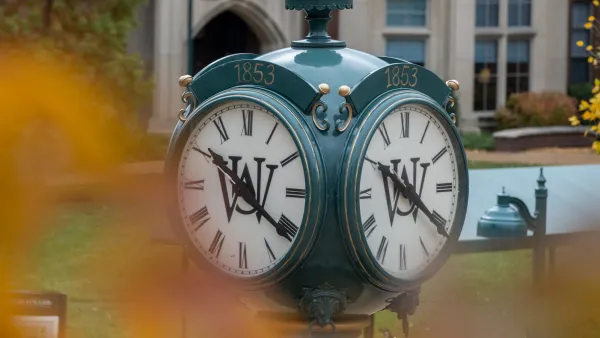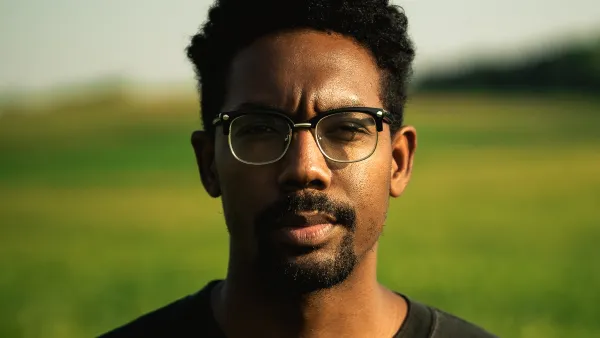The Writing as Advocacy workshop for WashU graduate students in the humanities and humanistic social sciences focused on writing as a tool for advocacy of various forms and the role of the humanities PhD in the contemporary world. Through a series of writing workshops and discussions with an array of humanities practitioners, graduate students explored ways they can use their most well-honed and readily deployable skill — writing — to achieve a variety of ends across the graduate school experience, both on campus and off.
How do we connect humanities writing and research with our values? How do we write ourselves into thriving as humanities practitioners? These questions shaped the recent Writing as Advocacy workshop for graduate students sponsored by the Center for the Humanities. As a humanities graduate student who took part in this event, I would like to share a few of the many insights I was able to gather from both panelists and participants that can teach us what it means to thrive rather than survive — and what we can learn about our writing practices and engaging in community from mushrooms.
On Thursday, March 28, a roundtable session featuring the six invited panelists kicked off the two-day event. The conversation, open to the campus community, touched on topics such as academic rigor, panelists’ experiences with grant writing and the unique skills humanities scholars cultivate in graduate school. [Ed. note: Video linked below.]
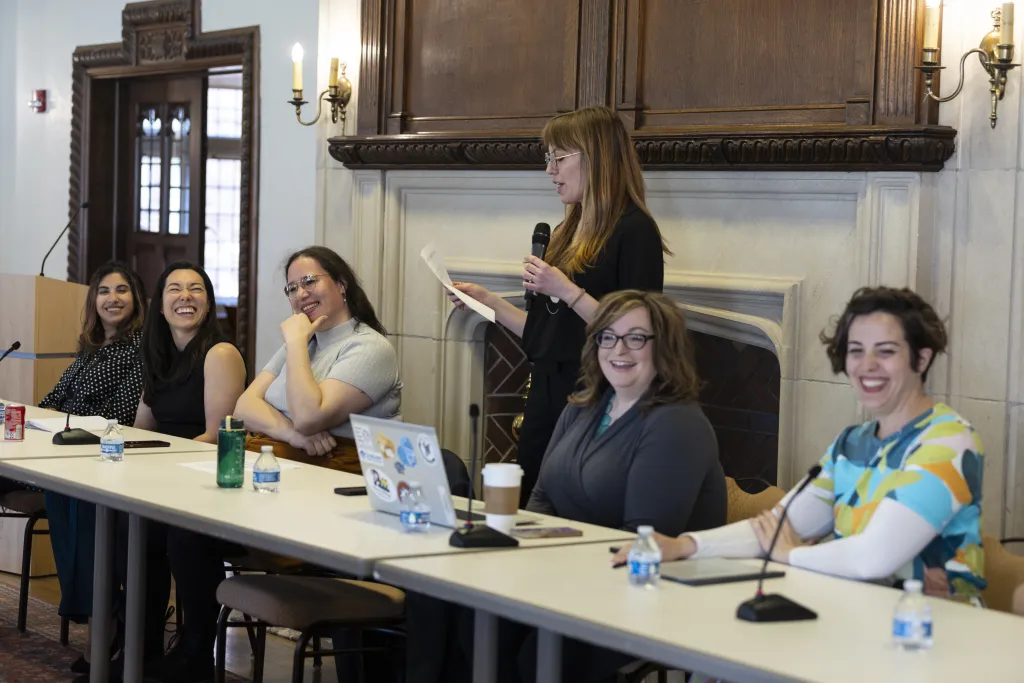
In order to frame our own work as crucial and communicate our work to a broad audience, panelist Margaret Nettesheim Hoffmann, associate director of career diversity for the Humanities Without Walls consortium and current doctoral student at Marquette University, suggested building a personal reflection practice: “Come to know yourself. Why is it that you started a PhD? Discernment is an important practice for learning about yourself.”
The discussion of individual values, community and lasting impacts continued during Friday’s workshop, where Roopika Risam, PhD, associate professor of film and media studies and of comparative literature at Dartmouth College, led the graduate student participants in creating power maps of university communities and sharing experiences of feeling both empowered and disempowered. We were also given a chance reflect on ourselves as members of a community — in both our professional and personal identities — and to identify how our individual projects provide an opportunity to take risks and push boundaries academically, while still cultivating our “whole selves.”
Self-cultivation also means dealing with failure. Katina Rogers, PhD, an independent scholar, editor and educational consultant and author of Putting the Humanities PhD to Work: Thriving in and beyond the Classroom, spoke about channeling failure to move forward: “I’m not comfortable with failures. I’ve been trying to reframe them as moments where I’ve taken a genuine risk. As I’ve been pushing boundaries, I’ve been failing a lot more. Seeing those as working toward something new has helped.”
One possibility for dealing with failure, Katja Perat, PhD, suggested, is to “develop a productive relationship with shame” and “be a little more playful [with negative feelings].” Perat, who is a Slovenian novelist, essayist and poet, and an assistant professor of writing at University of Alaska–Anchorage, also encouraged workshop participants to be more playful when it comes to scholarly writing projects through imagining their academic writing project as another medium — a documentary, interpretive dance or visual artwork, for example.
While this activity was out of my comfort zone, it spoke to the needs of other current humanities graduate students, as Cristina Correa (Comparative Literature) shared, “I am trying to create for myself a PhD student experience that supports and nurtures the incorporation (and invention?) of unusual creative and critical methods. Each of these concerns touches on my practices and interests, which include interdisciplinary/multimedia creative research, poetry and critical curiosity. I am concerned with how the breadth of my interests and the oddness of my practices can support one another, as well as how to make them legible to institutions that can also support me.”
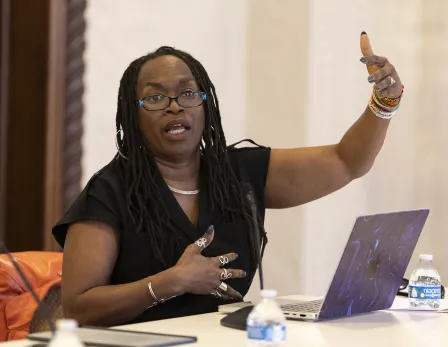
But what about using our scholarly interests to support our communities? Michelle Daniel Jones, a sixth-year doctoral student in the American studies program at New York University, shared some strategies for research that can simultaneously be forms of advocacy. She encouraged workshop participants to be non-extractive researchers — meaning conducting research in such a way as not to “take” from a community or group without giving back. Additionally, Jones noted the importance of questioning and countering the “silence of the archive” — digging deeper into questions that feel meaningful while being unafraid to push back against existing narratives. “Be mindful of the stakes [of your research], but not intimidated by them,” she said.
Finally, it’s important to acknowledge those who have made your academic and personal journeys possible, shared Ashley Cheyemi McNeil, PhD, director of education and research at Full Spectrum Features. Part of the joy of what she does, she said, comes from her varying experiences and from having “so many connective pieces.” So, nurturing our whole selves comes from putting together the pieces of our identities, our scholarly pursuits and our relationships.
But wait — what do mushrooms have to do with writing as advocacy? Graduate student Sylvia Sukop (Germanic Languages & Literatures) put it nicely: “Katina Rogers shared her fascination with mushrooms, how they require ‘slow attention’ to discover in the wild, to understand how they grow and their place within the larger ecosystem, [are] able to thrive only in a community of other plants. Mycologists take pleasure in not knowing everything about every mushroom they encounter, instead making discoveries through close attention and care. We as writers can likewise benefit from being in community and from letting go of the belief that we need to be experts every time we sit down to write.”
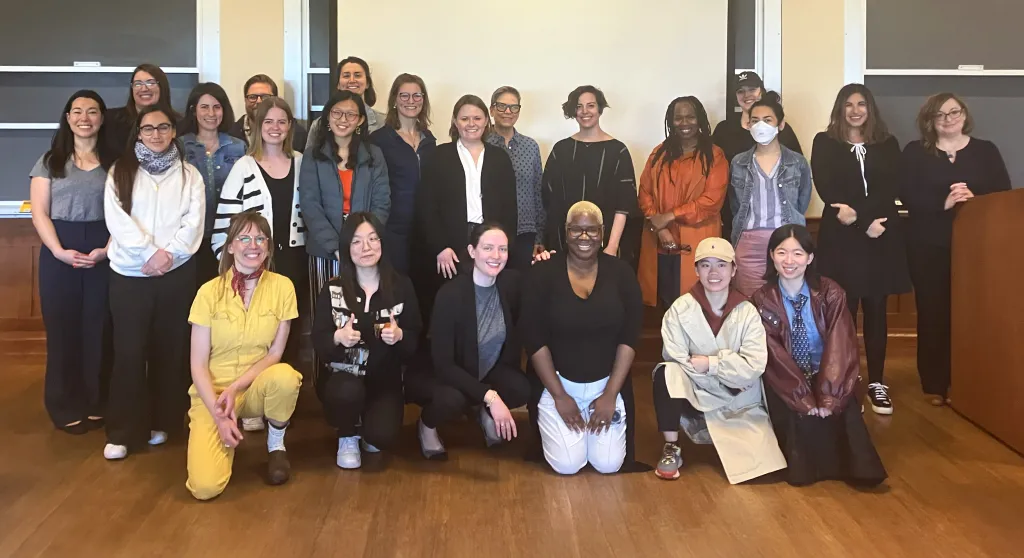
In sum, to better connect our professional lives with our personal values, here are six takeaways that can help us thrive as graduate students in humanities-related fields:
- Know ourselves. Building a personal reflection practice will allow us to better advocate for ourselves, our values and our scholarly endeavors.
- Find our power. Identify places and people on campus and in our communities that provide us with the power to act on something, that allow for collective action and solidarity and that further our understanding of our empowerment.
- Reframe our relationship with failure by learning to see failure as working toward something new.
- Don’t be afraid to play!
- Be mindful of the stakes but not intimidated by them.
- Acknowledge those who have helped along the way.
Kimberly Annas is a PhD student in the Department of Germanic Languages & Literatures. In spring 2024, she completed a mentored professional experience (MPE) with the Center for the Humanities.
Headline image via Pixabay.

